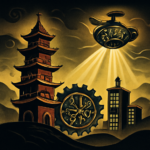“`html
Key Points
- Shanghai is rapidly becoming a global AI hub, driven by a “full-chain” AI system focusing on computing power, AI models, and application empowerment.
- The city boasts two major AI hubs: Xuhui MoSu Space (Xuhui Mosu Kongjian 徐汇模速空间), attracting over 400 large model enterprises, and Pudong Moli Community (Pudong Moli Shequ 浦东模力社区), home to nearly 200 companies focused on vertical model applications.
- Shanghai’s major AI industrial enterprises generated ¥118 billion RMB ($16.27 billion USD) in Q1 this year, marking a 29% year-over-year increase and a 65% jump in profits.
- The city has successfully attracted over 250,000 AI professionals and hosted the annual World Artificial Intelligence Conference (WAIC), which has brought over 6,550 top scientists to Shanghai.
- AI is being applied across various sectors, from a breakthrough invasive brain-computer interface (BCI) system by Shanghai Jieti Medical Technology Co., Ltd. (Shanghai Jieti Yiliao Keji 上海阶梯医疗科技有限公司) to smart health reminders in the Yu Garden Smart Community (Yuyuan Zhihui Shequ 愚园智慧社区) and optimized operations at Yangshan Port (Yangshan Gang 洋山港).

Shanghai’s AI scene is officially on another level, and we’ve got the data to prove it.
Imagine controlling a video game with nothing but your thoughts.
Sounds like sci-fi, right?
Well, it just happened in Shanghai, thanks to a breakthrough invasive brain-computer interface (BCI) system.
This isn’t just a party trick.
It was the first successful long-term human trial of its kind in China, developed by a local firm, Shanghai Jieti Medical Technology Co., Ltd. (Shanghai Jieti Yiliao Keji 上海阶梯医疗科技有限公司).
This kind of leap forward isn’t an accident.
It’s part of a massive, city-wide push, guided by a directive from General Secretary Xi Jinping to transform Shanghai into a globally influential hub of scientific and technological innovation.
To get there, Shanghai is going all-in on a “full-chain” AI system, focusing on three core pillars:
- Massive computing power as the foundation.
- Cutting-edge AI models to lead the charge.
- Real-world application empowerment to drive adoption.
Why Shanghai’s AI Industry is Booming: It’s All About Implementation
Talk is cheap. Shanghai is building.
The city has created a powerful AI industry landscape, anchored by two major hubs on opposite sides of the Huangpu River.
Think of them as the twin engines of Shanghai’s AI ecosystem:
- Xuhui MoSu Space (Xuhui Mosu Kongjian 徐汇模速空间) in the West: This is ground zero for the large model ecosystem. In just over a year, it has attracted over 400 large model enterprises. It’s a hotbed of core AI development.
- Pudong Moli Community (Pudong Moli Shequ 浦东模力社区) in the East: This hub focuses on incubating vertical model applications. It’s home to nearly 200 companies building specialized AI for sectors like intelligent cockpits. The community is designed so that the companies “upstairs and downstairs are upstream and downstream”—a truly integrated R&D pipeline.
And it doesn’t stop there.
Key infrastructure projects like the Lingang Smart Computing Center (Lingang Zhuan Jisuan Zhongxin 临港智算中心) are scaling up fast, creating an intelligent industrial network that spans the entire city.
The results speak for themselves.
In the first quarter of this year alone, the scale of Shanghai’s major AI industrial enterprises hit an insane ¥118 billion RMB ($16.27 billion USD).
That’s a 29% year-over-year increase, with profits jumping an eye-watering 65%.
AI isn’t just a buzzword here; it’s a core engine of the city’s economic growth.

Find Top Talent on China's Leading Networks
- Post Across China's Job Sites from $299 / role
- Qualified Applicant Bundles
- One Central Candidate Hub
Your First Job Post Use Checkout Code 'Fresh20'


ExpatInvest China
Grow Your RMB in China:
- Invest Your RMB Locally
- Buy & Sell Online in CN¥
- No Lock-In Periods
- English Service & Data
- Start with Only ¥1,000

Going Global: Open Cooperation as a Core Strategy
Shanghai isn’t building a walled garden.
The WAIC conference alone has drawn participants from over 80 countries and established partnerships with more than 30 international organizations.
This creates a global intelligence network where ideas flow freely.
For example, Dr. Abdel Atangana, a mathematician from Africa, used the WAIC stage to share how AI could be used to tackle water pollution in his home continent, providing smart public health solutions.
This is cross-border collaboration in action, often happening within frameworks like the “Belt and Road” Initiative.
AI in Action: From Smart Ports to Elder Care
According to Zhang Ying (Zhang Ying 张英), Director of the Shanghai Municipal Commission of Economy and Information Technology, the city is actively building a an intelligent computing power dispatch platform to push “AI + industry” applications forward.
This is where the rubber meets the road. AI is moving from “code in the laboratory” to tools that profoundly change how the city works and lives.
- In the Yu Garden Smart Community (Yuyuan Zhihui Shequ 愚园智慧社区), AI voice assistants provide health reminders for elderly residents who live alone.
- At the massive Yangshan Port (Yangshan Gang 洋山港) automated terminal, a large model scheduling system is smashing records for container throughput.
- The Lingang Smart Computing Center is providing accessible, inclusive computing power to companies across the entire Yangtze River Delta region.
- Yu Garden Smart Community: AI voice assistants assist elderly residents with health reminders.
- Yangshan Port: Large model scheduling system boosts container throughput.
- Lingang Smart Computing Center: Provides accessible computing power to Yangtze River Delta companies.
- Shanghai Jieti Medical Technology Co., Ltd.: Developed the first successful long-term invasive BCI system in China.
From the microscopic level of brain-computer interfaces to the macro level of global governance, Shanghai’s AI development is a contemporary masterclass in turning ambitious vision into tangible reality.

Resume Captain
Your AI Career Toolkit:
- AI Resume Optimization
- Custom Cover Letters
- LinkedIn Profile Boost
- Interview Question Prep
- Salary Negotiation Agent

References
- 人民日报头版聚焦:上海加速形成人工智能全链条体系 – 人民日报
- Official Website of Shanghai Municipal People’s Government – English
- World Artificial Intelligence Conference (WAIC) – Official Website
“`




